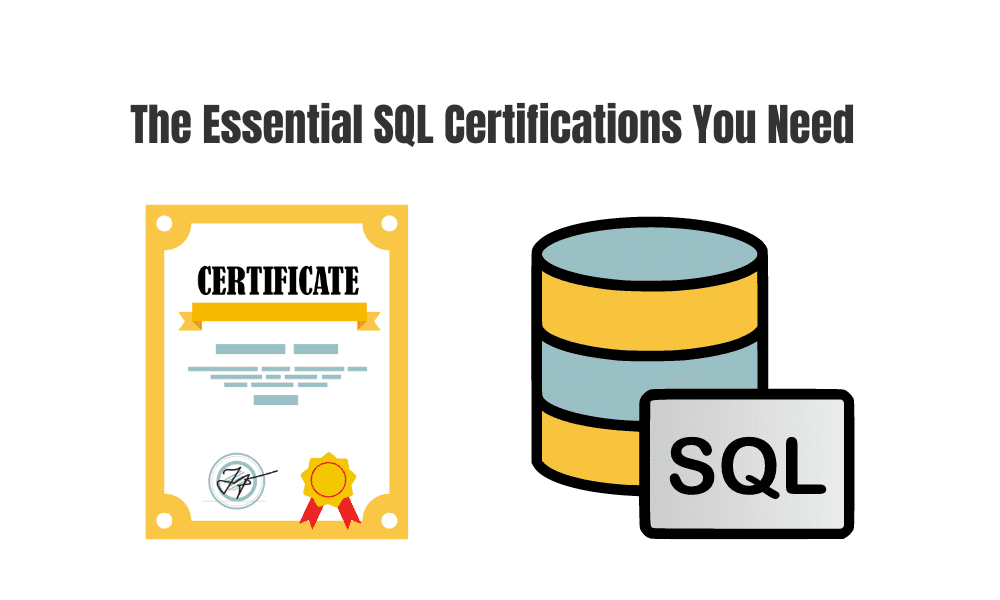
Image by Editor
SQL, pronounced s-q-l or sequel, stands for Structured Query Language. It is a programming language used to access and manipulate databases. When working with large datasets, one of the issues can be extracting exactly what you need from it.
SQL helps with this. Professionals can communicate with relational database systems by cleaning, sorting, extracting and processing large datasets. The demand for SQL specialists is still rising due to the valued assets of big data and the need for professionals who can process, assess, and analyze it.
There are different types of SQL certifications which are platform-specific. Depending on what database technology you are interested in which helps you determine which certification best suits you.
Link: Microsoft Azure Data Fundamentals
This course is aimed at beginners and can be completed in 1 month, committing 10 hours a week.
In this 5 course series, learn about the fundamentals of database concepts in a cloud environment. You will achieve basic skills in cloud data services, and build your foundational knowledge of cloud data services within Microsoft Azure.
The 5 courses are:
- Explore Core Data Concepts in Microsoft Azure
- Microsoft Azure SQL
- Microsoft Azure Cosmos DB
- Modern Data Warehouse Analytics in Microsoft Azure
- Preparing for DP-900: Microsoft Azure Data Fundamentals Exam
Link: Oracle SQL Databases Specialization
This course is aimed at beginners and can be completed in 1 month, committing 10 hours a week.
The Oracle SQL Databases specialization certification consists of 4 courses where you will learn how to create Oracle SQL Databases and understand how to insert, modify, and delete from Oracle SQL Databases.
The 4 courses are:
- Oracle Database Foundations
- Oracle Database Platform
- Oracle SQL Basics
- Oracle SQL Proficiency
Link: IBM Data Warehouse Engineer
This course is aimed at beginners and can be completed in 3 months, committing 10 hours a week.
The IBM Data Warehouse Engineer certification consists of 8 courses where you will learn the most up-to-date practical skills and knowledge data warehouse engineers use, how to deploy, manage, secure, monitor and optimize relational database systems like MySQL and PostgreSQL. You will also gain knowledge of various types of SQL and queries to access and manipulate data in databases.
The 8 courses are:
- Introduction to Data Engineering
- Introduction to Relational Databases (RDBMS)
- SQL: A Practical Introduction for Querying Databases
- Hands-on Introduction to Linux Commands and Shell Scripting
- Relational Database Administration (DBA)
- ETL and Data Pipelines with Shell, Airflow and Kafka
- Getting Started with Data Warehousing and BI Analytics
- Data Warehousing Capstone Project
Link: IBM Business Intelligence (BI) Analyst Professional Certificate
This course is aimed at beginners and can be completed in 4 months.
With the IBM Business Intelligence Analyst certification, you will be able to launch your Business Intelligence career in less than 4 months.
This certification is made up of 10 courses where you will learn about SQL queries, relational databases, data warehousing, data analysis as well as reporting techniques. You will learn how to apply statistical analysis methods to identify trends, create visualizations, and generate valuable insights, leading to informed decision-making and process improvement.
The 10 courses are:
- Business Intelligence (BI) Essentials
- Excel Basics for Data Analysis
- Data Visualization and Dashboards with Excel and Cognos
- Introduction to Relational Databases (RDBMS)
- SQL: A Practical Introduction for Querying Databases
- Getting Started with Data Warehousing and BI Analytics
- Statistics Fundamentals Using Excel
- Getting Started with Tableau
- Advanced Data Visualization with Tableau
- BI Analyst Capstone
Link: PostgreSQL for Everybody Specialization
This course is aimed at the intermediate level and can be completed in 1 month, committing 10 hours a week.
This PostgreSQL for Everybody certification consists of 4 courses. In these courses, you will learn the basics to the advanced of SQL. You will dive into how to use the PostgreSQL database effectively, explore database design principles, database architecture and deployment strategies as well as be able to compare and contrast SQL and NoSQL database design approaches.
The 4 courses are:
- Database Design and Basic SQL in PostgreSQL
- Intermediate PostgreSQL
- JSON and Natural Language Processing in PostgreSQL
- Database Architecture, Scale, and NoSQL with Elasticsearch
Although knowledge and experience is prioritized over certification. It is important to know that hiring managers do prefer applicants who are certified. When choosing the right SQL certification, make sure you take into consideration the particular vendor or platform that the job you want it asking for.
Nisha Arya is a Data Scientist and Freelance Technical Writer. She is particularly interested in providing Data Science career advice or tutorials and theory based knowledge around Data Science. She also wishes to explore the different ways Artificial Intelligence is/can benefit the longevity of human life. A keen learner, seeking to broaden her tech knowledge and writing skills, whilst helping guide others.